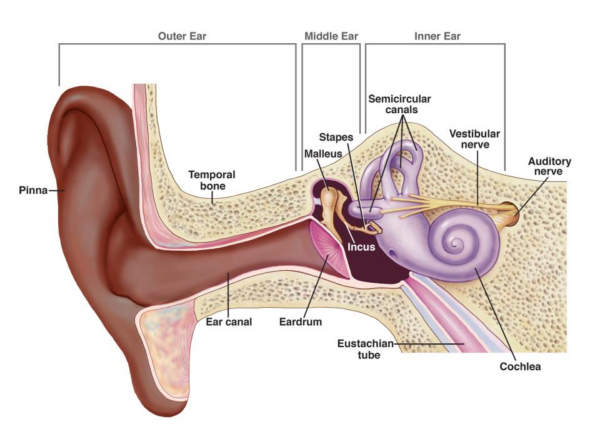June 13, 2024

By: AEOP Membership Council Member Neha Sharma
Do you like music? If so, then you are part of the 93 percent of the US population that likes music. Have you ever wondered how we hear and what happens in our brain that tells us that we like music? To help answer that question, we need to look at how we process sound. Sound waves enter the ear canal and cause the eardrum to vibrate. These vibrations pass through three connected bones in the middle of the ear, setting fluid in the inner ear into motion. This moving fluid bends thousands of delicate cells, which convert the vibrations into nerve impulses, impacting 25,000 nerve endings. These nerve endings transform the vibrations into electrical impulses that then travel along the eight cranial nerves, called the auditory nerves, to the brain. The brain then interprets these signals, which is how we hear.
 Some areas of the brain compare the signals coming from each of the two ears to determine where the sounds originated. Other brain areas decode, or process, language and music. Listening to or making music increases blood flow to some regions of the brain that generate and control emotions. The limbic system is involved in processing emotions and controlling memory. It “lights up” when our ears recognize the music, letting us know that we like what we are hearing.
Some areas of the brain compare the signals coming from each of the two ears to determine where the sounds originated. Other brain areas decode, or process, language and music. Listening to or making music increases blood flow to some regions of the brain that generate and control emotions. The limbic system is involved in processing emotions and controlling memory. It “lights up” when our ears recognize the music, letting us know that we like what we are hearing.
Music is a calming mechanism that we have been creating and listening to for centuries, whether playing an instrument, singing or just listening. Research shows that music can also be a pain relief mechanism. For example, loved ones frequently play music for family members who are not feeling well. The pain-relieving tendencies of music are attributed to its ability to distract us when our minds are focused on a cherished melody. When you listen to a moving piece, you might feel chills, which may result from the release of dopamine, a neurotransmitter that triggers sensations of pleasure and happiness. As your brain becomes familiar with a particular song, your body may release dopamine upon hearing just the first few notes. Dopamine is the communicator between nerve cells in your brain and the rest of your body, and it also acts as a hormone. Dopamine influences certain areas of your brain to give you feelings of pleasure, satisfaction and motivation.
Music has great value in our lives – from calming us to making us happy to providing pain relief and everything in between. I love listening to music to relax, especially on a very stressful day.
Sources:
https://www.pfizer.com/news/articles/why_and_how_music_moves_us#
https://www.ncrar.research.va.gov/Education/Documents/BrainHearing.pdf
https://my.clevelandclinic.org/health/articles/22581-dopamine
Find a Volunteering Opportunity
Visit our Program Volunteers page for a tool to find the best opportunity for you.
eCYBERMISSION Mini-Grant
The eCYBERMISSION Mini-Grant is intended to support teachers/program leaders as they implement eCYBERMISSION with their teams. Educators (formal and informal) of students in grades 6-9 are encouraged to apply.
